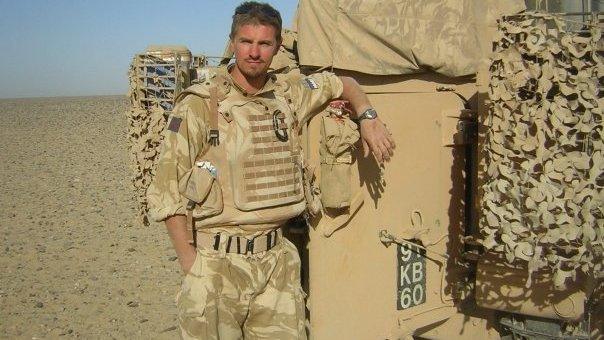SAS deaths: 96 soldiers on mountain exercise to be questioned
- Published

Cpl James Dunsby died after taking part in the exercise in the Brecon Beacons
Police investigating the deaths of three army reservists after an SAS selection exercise on the Brecon Beacons are to interview more than 90 soldiers to find out what happened.
Aberdare Coroner's Court heard it would take weeks to speak to them all.
L/Cpl Craig Roberts, of Penrhyn Bay, Conwy and L/Cpl Edward Maher died in July after a 40-mile (64km) hike in temperatures reaching 29.5C (85F).
Cpl James Dunsby, from Bath, died two weeks later in hospital.
A pre-inquest hearing into the deaths of L/Cpl Roberts, 24, L/Cpl Maher and Cpl Dunsby, both 31, was held by Powys coroner Louise Hunt.
Det Insp Iwan Jones told the hearing that the scale of investigation had widened and the 20 police officers on the investigating team would be talking to up to 96 soldiers who were present on 13 July as well as emergency service personnel and other witnesses who were on the mountain that day.
The full inquest is not likely to be heard until next year
"Having reviewed some of the evidence we have decided to expand the investigation," he said.
"We aiming to have statements from a substantial number of soldiers - between 94 and 96 - emergency service personnel and members of the public.
"We are still waiting for (all of the) soldiers accounts from the army at this moment in time... there have been logistical problems as some of these are now serving abroad."
Representatives of the MoD, the HSE and L/Cpl Maher's and Cpl Dunsby's families were also present in court.
The coroner said she would be looking at four main areas: cause of death for each man, the preparation and planning of the exercise, supporting and monitoring during the exercise and procedures in place in case of an emergency.
L/Cpl Maher's father, also called Edward, spoke during the short hearing to stress his family's desire for the inquest to establish the army's chain of command on the day his son died.
Ms Hunt confirmed that the inquest would look at Article two of the Human Rights Act, which states a person's right to life should be protected by the state.
Both the police and the HSE could instigate criminal proceedings.
Lt Col Freddie Kemp, from the Parachute Regiment, representing the MoD, said the service police could also become involved in a criminal investigation once Dyfed-Powys Police had concluded its investigation.
'Right to life'
Ms Hunt told the court: "No decision has been made about any further action at this stage."
She also asked the interested parties if they agreed that the inquest needed to take account of the right to life under Article Two of the Human Rights Act, which as well as protecting the right to life of a person also required a "positive duty to protect life" in certain circumstances.
There were no objections.
Provisional dates for a two-week inquest have been set for February and March 2014.
The coroner's investigation is part of a new system in relation to inquests.
At the end of an investigation, if the death is not due to natural causes, he will open an inquest.
Another pre-inquest review will be held on 19 November.
- Published31 July 2013
- Published31 July 2013
- Published24 July 2013
- Published21 July 2013
- Published16 July 2013
- Published15 July 2013
- Published15 July 2013